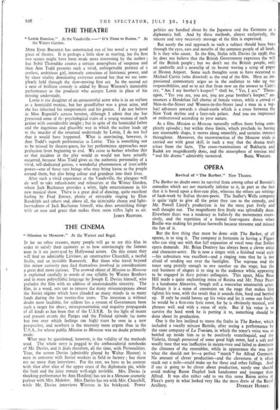THE CINEMA
4, Mission to Moscow." At the Warner and. Regal.
IF for no other reasons, many people will go to see this film in order to satisfy their curiosity as to how convincingly the famous men in it are portrayed by Hollywood actors. On this count they will find an admirable Litvinov, an unattractive Churchill, a tactful Stalin, and an invisible Roosevelt. But those who travel beyond this minor curiosity may find themselves involved in considerations a great deal more curious. The avowed object of Mission to Moscow is explained carefully in words of one syllable by Warner Brothers and in more polysyllabic language by Joseph E. Davies himself, who preludes the film with an address of unmistakeable sincerity. The film, in a word, sets out to remove the many misconceptions about the Soviet regime which have clouded so many minds in so many lands during the last twenty-five years. The intention is without doubt most laudable, for seldom has a system of Government been such a target for abuse, misrepresentation and negative propaganda of all kinds as has been that of the U.S.S.R. In the light of recent and present events the Purges and the Finland episode (to name but two over which feelings ran high) must be seen in a new perspective, and nowhere is the necessity more urgent than in the U.S.A., for whose public Mission to Moscow was no doubt primarily made.
What may be questioned, however, is the validity of the methods used. The whole story is pegged to the ambassadorial notebooks of Mr. Davies, and it deals therefore, all the time, with Personalities. True, the screen Davies (admirably played by Walter Huston) is seen in converse with Soviet workers in field or factory ; but these are no more than interviews. For the rest, we have to be content with slice after slice of the upper crust of the diplomatic pie, while the fruit and the juice remain well-nigh invisible. Mrs. Davies (a shocking performance by Ann Harding) has tea in a Moscow cosmetic parlour with Mrs. Molotov. Miss Davies has tea with Mrs. Churchill, while Mr. Davies interviews Winston in his brickyard. Power politics are bandied about by the Japanese and the Germans at a diplomatic ball. And by these naelhods, almost exclusively, the sincere and very necessary message of the film is expressed.
• But surely the real approach to such a subject should have been through the eyes, ears and mouths of the common people of all lands.
It is they who count. In the film Stalin tells Davies (in 1938), that he does not believe that the British Government expresses the will of the British people ; but we don't see the British people, only an umbrella and a newsclip of its bearer waving a scrap of paper at Heston Airport. Some such thoughts seem to have occurred to Michael Curtiz (who directed) at the end of the film. Here an im- passioned commentary urges us in the audience to take up our responsibilities, and so to act that from now on the answer to Cain's cry, "Ant I my brother's keeper? " shall be, "Yes, I am." There- upon, "Yes you are, you are, you are 4/our brother's keeper," an- nounces a Handehan full chorus of female voices, while a crowd of Men-in-the-Street and Women-in-the-Street (and a man in a top- hat) advances towards a cloud-castle which is a cross between the New York skyline and a fairy-tale palace. And you are impressed or embarrassed according to your nature.
As a film, Mission to Moscow naturally suffers from being com- pletely episodic • but within these limits, which preclude its having any reasonable shape, it moves along smoothly, and sustains interest throughout. Moreover, the reconstruction of the Moscow trials is carried out with great skill, in such a way that the drama truly arises from the facts. The cross-examinations of Bukharin and Radek are magnificently done, and the atmosphere of tension Ind'






















 Previous page
Previous page